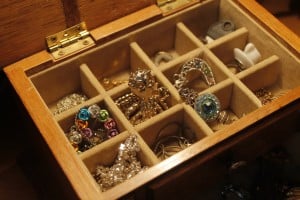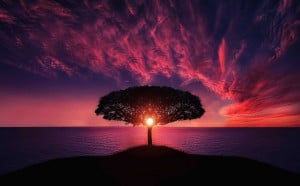 A Black Pagan: Minority within the Minorities
A Black Pagan: Minority within the Minorities
This piece is based from my perception and experiences. It is not a representation of “all black folks.” Although, I am sure that there will be individual black minorities within the minorities who can relate to my sentiments.
For black Pagans/Wiccans/African-Traditionalists, Atheists, Buddhists, Hindus, and Humanists (to name a few), being anything but Christian can be “challenging” if not, “threatening,” to the sociological and psychological foundation of what individual blacks in America and/or black Americans view as “our cultural identity.” I must reiterate for those who don’t follow me on Patheos that I am a first generation American from Haitian-born immigrants. That being said, I try not to use the term “black culture,” for my cultural heritage is different, even though there are similarities, from black Americans. Even black Americans from generational North have a different “culture” than blacks in generational South. Black culture is as diverse as the world is diverse. Black immigrants from predominately “black” countries also have different cultures from one another.
This is similar to Chinese immigrants having different cultures from Japanese immigrants. Therefore, it is my opinion that “black culture” should not be pigeonholed, for it is impossible to pigeonhole…we begin to start stereotyping (this can be positive and negative).
Back to being black and non-Christian in the United States: My personal experience so far with black Americans knowing that I am not Christian has been positive. I can count on one hand the ones that I actually had indifferences with due to my religious belief. I basically tend to “keep it moving” without dwelling in pain. I know that there will be those who would discriminate against me based on whatever reason. Yes, there was one friend that I felt deeply hurt, but I understood her misconception and forgive her for it. I understood that my faith challenged the sociological and psychological (ie: How can she be “Christ-like” and not a Christian?) foundation of her black identity, which is her Christian identity. The reason why I mentioned the “black identity” for her is that we met and grew fond of one another via an organization to “uplift” the underserved black community. “Tradition” has it; most of the organizations that directly serve to uplift impoverished and underserved black communities are the black church, to which black church equates to Christianity. So, I met her at an organization that was sponsored by a black church that is Christian. This leads many to assume that I must be a Christian. I understand where she felt betrayed or “bamboozled.” I never lied to her—she just mistakenly assumed, like many assume.
I cannot deny the role Christianity played in slavery, both negative and positive, but via the black American’s eye, Christianity played a powerful and spiritual role, predominately. Yes, the first Africans who came to America via the slave trade were not Christians. Christianity became either a “indoctrinated” religion by force or birth, via the first slave descendants who no longer have any cultural ties to their ancestors’ “native land.” Language was lost, cultures have been lost…but one thing that was never lost was the thirst and need for spirituality; for spiritual solace. Christianity became the faith for many descendants of slavery to hold onto. The spiritual longing and answers did not change, just the faith/religion changed. As my Haitian ancestors adopted by blending African-Religion with Catholicism to make Voodoo, so did the slaves in the US adopt their thirst for spirituality with Christianity (not all, but many). For many ancestors, I am sure, to make their voice heard, they must speak in the tongues of their new land and masters. That tongue is Christianity. It is absolutely brilliant how the ancestors in America used the same Christianity that may or may not justify the injustice for some individuals against the very same individuals who “forced it upon them.” Harriet Tubman, an abolitionist, humanitarian, spy, nurse, and freedom fighter is nicknamed “The Black Moses.” “Moses”- an inspirational figurehead that many white Christians can relate to (must speak in their language in order for them to understand). The black church has produced many inspirational black freedom fighters and movements that I will NEVER deny or downplay. So, I do understand when our generation and/or time, after the civil rights movement, may or may not feel free to believe or not to believe. I understand how it can challenge some individual black folks. It can seem to some that not only are black Americans turning away from the “one true religion,” but also turning away from the religion that gave solace and fought for equality at a period of time. It can seem as a “double-edged sword.”
The only basis for my opinion is that I do have friends who are black Atheists and Buddhists who receive “more” flack than I’ve personally experienced. I must admit, when I do tell individuals that I do observe African-Traditionalist religion, it seems that I secretly get a “free-pass.” Unspoken words of, “Oh, she is just going back to her roots.” Especially when I also reveal that I am first generation Haitian-American. I’m sure many black Wiccans and Pagans can somewhat understand my perception. I am sure when individual black Wiccans or Pagans come out of the proverbial broom closet, the first question asked, “Do you do Voodoo?” “Do you practice Hoodoo?” or any African based religion: and when those individuals ask, some may hear the “I hope it is” in their tones. Again, I’ve experienced individual black folks who also hold the misconception of my belief as seen in “mainstream” Christian fundamentalist Americans, regardless of race. As in “mainstream” America, it is so in the black community. You have liberals, conservatives, Republicans, Democrats, Independents, fundamentalists, vegans, vegetarians, and the list goes on. There is diversity within black community, somewhat an unspoken word for few.
Religious diversity is rarely spoken in the black community and media outlets. I’ve come across those who rather say they are Christians than Agnostic. I can sense they are agnostic by their speech, but to mutter the words, “I’m Agnostic,” I perceive, can be difficult. To mutter, “I believe in Christ. I just don’t believe in Christianity” can be hard to swallow. I believe the first black casted show that displays the unspoken word is Sanford & Son where Aunt Esther took issues with “heathens” (she meant it derogatory, like many others who are ill-informed of heathenry). Her character is extreme, but there are “Aunt Esthers” abound, male and female, who took issue with any black folks who don’t identify themselves as Christians. Aunt Esther had zero tolerance for individuals (in this case, black folks since it is an all-black cast) who don’t believe in the Christian deity. She had some tolerance for those who simply don’t go to church for she has this immense hope that one day, they will “see the light” and come back to church. Or, with a bit of her help, encourage them to go to church.
It is from that moment, when I was a child watching Sanford and Son, that I realized the lack of understanding, if not tolerance, for black Atheists or anyone who is black and not a Christian. Even HBCU (historically black colleges and universities) is tied to Christianity. So, where does a black American or individuals who live in black America who are not Christian, but would like to attend an all-black college, go? The answer: some go into the proverbial “closet”. I must admit that there is change in the mentality of black colleges. Just recently, HBCU held a seminar to address and educate on the black LGBT community. An issue that is long overdue and I’m overjoyed that many black generations “today” want to break away from “keep it in the closet” thinking or “no such thing black LGBT” thinking. I hope soon there could be a dialogue of black interfaith or non-faith. I, for one, can speak upon myself. I will always admire the black church’s involvement in equality and uplifting the black community. For some, the issue is not the “black church” as a “figurehead” for inspiration. It is the doctrine for some, it is the theology for some, it is Christianity for some…for some, it is not for them or they don’t believe. Two issues: believing and respecting the historic black church vs. the religion. The proverbial black church was a meeting place in a time where there were not too many places for black folks to congregate and meet. Honestly, we don’t know if back then, there were black folks who were “closeted” non-Christians but resorted to the black church for respite, relaxation, and to get together with the community. I’m assuming there were non-Christian believers among the Christian believers during those times for even to this day, in my time, for me to volunteer services to uplift the black community: there is a link with a Christian organization (or Muslim), or today’s modern church. We must admit that black church is…well, church. A place for worship. A place to get together with other Christians. Today, there are many organizations that uplift the black community. Granted, many of them are linked to religious groups, nevertheless, they don’t call for me to step inside the church. I think that is what gave my non-Christian belief away to my friend. I never attended the “on-site” or “off-site” directly church-related functions. I attended the “secular” organization, even though there is a link to the church…but it wasn’t
“really” about the particular church.
Maybe the black community needs more Humanists, Atheists, Buddhists, Pagans, and the list is endless, organizations within the black community to make ourselves known. Or an organization that is non-denominational that is black-run and owned to build this “things we shall not speak of” bridge between “us.” That is the key…black-run and black-owned. Maybe we need a black college that is secular with no hidden religious affiliation ties. A secular black college. A place that black minorities within the minorities can come together in love, peace, respect, and tolerance with the majorities (black folk) within the minorities…
A place to clear up the misconceptions and stereotype of what “black culture” is…which diversity that can’t be contained inside a box.















